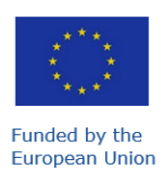
Politecnico di Milano (POLIMI) is a leading Italian scientific-technological university. The DEIB pursues ambitious research, educational, and societal goals at the cutting edge of research. Dr. Giulia Acconcia is expert in the design and development of integrated and system electronics for single-photon detectors. Single-photon detection systems based on her research have been successfully exploited in a wide variety of applications, ranging from fluorescence lifetime and underwater imaging to spaceborne lidar.

Fondazione Politecnico di Milano (FPM) is an Italian non-profit foundation established at the behest of POLIMI. FPM is actively engaged in developing multidisciplinary innovation projects in partnership with companies, public authorities, and research centers, in Italy and across Europe. It supports Project Management, Research Capitalization, Technology Transfer, the creation of enterprises, and sustains the finest startups through its management of the PoliHub Innovation Park & Startup Accelerator incubator. It promotes initiatives concerning corporate social responsibility and international cooperation. In QLASS, FPM will specifically support POLIMI in managing the project due to the robust and consolidated experience developed during the years.
Pixel Photonics is a pioneering deep-tech start-up that was founded in 2020 and originated as a spin-off from the Universty of Münster. The company has developed a unique approach to integrate SNSPDs (Superconducting Nanowire Single Photon Detectors) on a chip waveguide. This way, Pixel Photonics combines the superior features of SNSPDs with the versatility of an integrated photonic platform to provide highly parallelized, efficient and ultra-fast single-photon detection. Waveguide integration enables the use of SNSPDs for photon counting, paving the way for high-performance and scalable photonic quantum computing. The Pixel Photonics team consists of 36 employees from 9 different countries.

Sapienza Università di Roma (SUR) is a world-renowned Italian multidisciplinary
university. Prof. Fabio Sciarrino, Dr. Gonzalo Carvacho, and Dr. Nicolò Spagnolo of the
Quantum Information Lab have a broad scope of research into the fields of Quantum
Optics and Quantum Information, making ground-breaking advances in experimental
quantum optics, computation and quantum information, and foundations of quantum
mechanics, focusing recently on implementing quantum information protocols via
integrated photonic circuits.

Ephos Srl (EPHOS) is the leading Italian QPIC SME founded in 2022 as a spin-off from Consiglio Nazionale delle Ricerche (CNR) by Dr. Andrea Rocchetto, Dr. Roberto
Osellame, Dr. Francesco Ceccarelli, and Dr. Giacomo Corrielli. EPHOS manufactures and commercializes quantum photonic processors with unprecedented computational complexity and substantially lower photon losses for a given number of modes compared to competing devices, a fundamental step towards scalable quantum computation.

The CNRS-Institut Charles Gerhardt Montpellier (CNRS-ICGM) stands as a prominent French CNRS laboratory and ranks among Europe’s foremost institutes dedicated to advancing fundamental and applied material science within the realm of energy storage and conversion. Within ICGM, the “Theoretical Physical Chemistry and Modelling” department serves as a hub, uniting accomplished specialists in the domains of material science modelling, electrochemistry, theoretical chemistry, and quantum computing theory. Professor J.-S. Filhol is expert in ab initio modelling of energy storage systems, particularly in the realm of Li-Ion batteries. His skills extend to encompass complex factors such as interfaces, potential dependent behaviors and electrolyte effects, enhancing our understanding of energy storage mechanisms. Dr. B. Senjean is expert in the methodological development of algorithms for condensed matter physics and quantum chemistry for both classical and quantum hardware, thus ensuring a seamless translation of chemical challenges into the formalism of quantum computing. This unique blend of skills and knowledge positions us at the forefront to apply quantum computing to realistic problems in the field of battery technology.



Université de Montpellier (UM) stands as a beacon of excellence in education
and research within the European landscape. With a legacy dating back to the
13th century, this institution has evolved over the years to become a modern and internationally renowned university. The University’s commitment to innovation, diversity, and sustainability makes it a prime partner for a wide array of European projects aimed at advancing knowledge, fostering collaboration, and addressing the challenges of our rapidly changing world. Université of Montpellier is in particular co-managing with CNRS the Institut Charles Gehard Montpellier (ICGM) that is involved in the QLass project. Therefore, one of the research group Member Prof. J.-S. Filhol is both a university professor at Université de Montpellier and a researcher at ICGM “Theoretical Physical Chemistry and Modelling” department justifying its involvement in the project QLass.

Schott AG (SCHOTT) is a German leading global manufacturer of specialty glass, glass ceramics, and other advanced materials. With one of the most successful R&D departments in the global manufacturing industry, SCHOTT has extensive knowledge of materials and a high level of technological expertise. On this basis, SCHOTT produces customer-specific glass solutions that enable higher performance and open up new market opportunities. Drs. Oliver Hochrein, Thorsten Damm, and Jens Ulrich Thomas continuously work on improving the properties of glass and glass devices.





